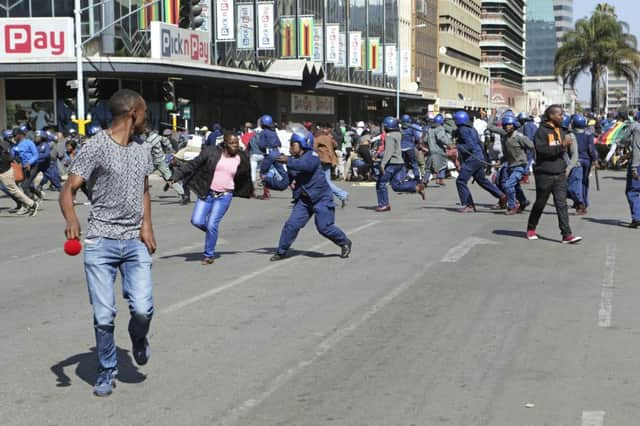Zimbabwe police fire tear gas and arrest 80 at protests in capital


Seven people were injured, including one in critical condition, and 80 people were arrested, said Nelson Chamisa, leader of the Movement for Democratic Change opposition party that organised the demonstrations.
“There is not going to be any rest until we achieve a people’s government...we will continue to mobilise,” said Mr Chamisa, following a day of clashes between police and opposition demonstraters.
Advertisement
Hide AdAdvertisement
Hide AdA few hundred demonstrators gathered in Africa Unity Square in central Harare, despite a police ban on the protest that was upheld by the High Court.
Police fired tear gas which engulfed the square to disperse the protesters, who ran into nearby streets. Officers used batons to beat several people. One woman collapsed on the street after being beaten. Despite the clashes, the opposition said protests will spread to other cities next week.
Zimbabwe’s economic turmoil – with inflation at 175 per cent, widespread power cuts lasting up to 19 hours a day and shortages of water – are blamed for the rising tensions.
From the hope that swept across the country with the forced resignation of tyrant Robert Mugabe in November 2017, the nation has returned to widespread resentment and fear, according to government critics and residents.
Human rights groups said six anti-government activists were abducted and tortured this week before the protests.
President Emmerson Mnangagwa urged the opposition to engage in dialogue, but at the same time his government pushed parliament to quickly adopt new security legislation branded repressive.
To discourage the protests, teams of police searched vehicles at checkpoints on roads leading into the city and warned people to stay away.
Mr Mnangagwa, 77, came to power with promises of sweeping political and economic reforms.
Advertisement
Hide AdAdvertisement
Hide AdBut his government is widely viewed as an extension of Mugabe’s economic mismanagement and heavy-handed security, according to human rights groups.
About a third of Zimbabwe’s 15 million people are in dire need of food aid.
Amnesty International has accused Mr Mnangagwa’s administration of “using some of the brutal tactics seen under the government of Robert Mugabe”, said Muleya Mwananyanda, Amnesty International’s deputy regional director for southern Africa.
“Instead of listening to protesters’ concerns, the authorities have used torture and abduction to crush dissent.”